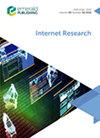谁相信政治假新闻?阴谋心态、爱国主义、对自由的威胁、媒体素养和对虚假信息的关注的作用
IF 5.9
3区 管理学
Q1 BUSINESS
引用次数: 0
摘要
了解个人对政治假新闻的敏感性是至关重要的,因为假新闻可以针对弱势群体的特定心理特征。因此,本研究考察了五种个人风险(即易感性)和弹性(即保护性)因素、阴谋心态、爱国主义、对自由的感知威胁、媒体素养和对虚假信息的关注,以确定它们是否会影响人们对政治假新闻的信仰,以及随后,信仰在多大程度上影响人们对政治假新闻的参与。使用虚构的政治假新闻刺激,作者对10个半结构化访谈进行了演绎主题分析,并对722名英国公民进行了在线调查,使用结构方程模型进行了分析。研究发现,阴谋心态和爱国主义与政治假新闻的信仰呈正相关,而媒体素养和对虚假信息的关注与政治假新闻的信仰呈负相关。在定性数据中,感知到的对自由的威胁是一个很强的主题,但在统计上对政治假新闻的信任度没有影响。对政治假新闻的信仰与进一步参与假新闻故事呈正相关,在模型中扮演中介角色。原创性/价值不同于以往关注党派关系和分享行为的研究,本研究提出了一个以社会认同理论为基础的模型,以建立对政治假新闻信仰的综合理解。研究结果表明,在研究个人对政治假新闻的敏感性时,超越党派关系的政治认同动机是显著的,对政治假新闻的信念在理解随后的私人参与故事方面起着核心作用。本文章由计算机程序翻译,如有差异,请以英文原文为准。
Who believes political fake news? The role of conspiracy mentality, patriotism, perceived threat to freedom, media literacy and concern for disinformation
PurposeUnderstanding individual susceptibility to political fake news is critical because fake news can target specific psychological profiles of vulnerable individuals. Consequently, this research examines five individual risk (i.e. susceptibility) and resilience (i.e. protective) factors, conspiracy mentality, patriotism, perceived threat to freedom, media literacy and concern for disinformation, to determine if they inform belief in political fake news and subsequently, to what degree belief impacts private engagement with political fake news.Design/methodology/approachUsing a fictional political fake news stimulus, the authors conducted a deductive thematic analysis of 10 semi-structured interviews and an online survey of 722 United Kingdom (UK) citizens analysed using structural equation modelling.FindingsConspiracy mentality and patriotism were positively associated with belief in political fake news, while media literacy and concern for disinformation were negatively associated with belief in political fake news. Perceived threat to freedom was a strong theme in the qualitative data but had no statistical effect on belief in political fake news. Belief in political fake news was positively associated with further engagement with the fake news story, acting as a mediator in the model.Originality/valueDistinct from previous research that focuses on partisanship and sharing behaviour, this research forwards a model underpinned by social identity theory to build an integrated understanding of political fake news belief. The results demonstrate that political identity motivations beyond partisanship are salient when examining individual susceptibility to political fake news and that belief in political fake news plays a core role in understanding subsequent private engagement with the story.
求助全文
通过发布文献求助,成功后即可免费获取论文全文。
去求助
来源期刊

Internet Research
工程技术-电信学
CiteScore
11.20
自引率
10.20%
发文量
85
审稿时长
>12 weeks
期刊介绍:
This wide-ranging interdisciplinary journal looks at the social, ethical, economic and political implications of the internet. Recent issues have focused on online and mobile gaming, the sharing economy, and the dark side of social media.
 求助内容:
求助内容: 应助结果提醒方式:
应助结果提醒方式:


